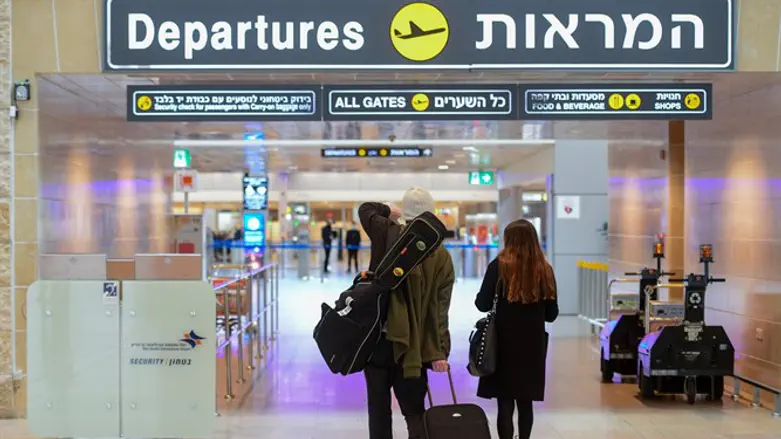
Following the revelation that thousands of travelers are returning to Israel from countries they are forbidden to visit according to Health Ministry directives, many of them bringing coronavirus back with them, the Ministry is planning stricter enforcement of the rules, Yediot Aharonot reports.
According to the report, all those traveling abroad will be required to fill out an online form declaring that they will not be flying to any one of the six countries currently on the banned list (Russia, India, Mexico, South Africa, Brazil, and Argentina) and that their final destination is not one of the six countries.
The declaration will also include a short explanatory note warning of the consequences of falsifying information.
Despite the ban on visiting countries where the risk of contracting coronavirus is currently considered extremely high, direct flights from Israel to the six locations will continue to take off from Ben Gurion airport. Asked to explain this apparent contradiction, a government official told Yediot Aharonot, “The fact that direct flights will be continuing to these destinations will make it easier for us to monitor the situation and conduct checks on traveler movement.”
What is being proposed is that passengers will arrive at the airport with their signed declaration in hand, and will be asked to present it to an airport official before boarding their flight. If the official sees that the final destination noted on the form is located in one of the six banned countries, he will summon another official responsible for enforcement of coronavirus regulations, and the traveler will be issued a fine of NIS 5000.
Travelers returning from abroad will also be questioned on their country of origin, and those who are found with stamps in their passports from one of the six banned countries will be fined 5,000 shekels. However, not all arrivals will be ordered to state their country of origin – only random checks will be made. Nonetheless, the official cited in the report claimed that even such spot-checks will significantly reduce the number of Israelis visiting countries where the incidence of coronavirus is exceptionally high.
Parallel to these proposals, new regulations are set to go into force at Ben Gurion airport within the next few days. Face masks will be required within all areas of the airports’ terminals, and with the opening of a new Covid-19 testing site at the airport, another 30 testing stations will become operative within the week.
Despite the government’s acknowledgment that the Delta mutation is now spreading in Israel, a mutation that is known to be far more contagious than the previous prevalent strain, there are currently no plans to close Ben Gurion airport entirely at any point in the future.
“[Prime Minister Naftali] Bennett wants to take immediate and pinpointed steps,” the abovementioned official said. “Dr. Sharon Alray-Price, head of Public Health Services, is currently drawing up a plan detailing all the regulations and restrictions as they apply to individual countries, depending on their rates of contagion.”
On Tuesday, Prime Minister Bennett visited Ben Gurion airport and said that he is viewing the current situation as a “new outbreak” of the coronavirus.
“The Delta strain is spreading rapidly around the world,” he said, “and its contagion rate is much higher than we first thought. It is around 50% more infectious than the original strain, and we are already seeing it beginning to spread within Israel.”
Bennett also admitted that the new mutation “also infects people who have been vaccinated,” and indeed, Israelis returning from countries with a high contagion rate of Covid-19 are now legally required to self-isolate, even if they have received both Pfizer vaccine doses.
“I ask those who do not have to travel abroad not to do so,” Bennett added. “The outbreak in Binyamina originated with a family that returned from a vacation in Cyprus.”
Bennett also announced that the government would be setting up a new coronavirus cabinet to address all Covid-19-related issues.
